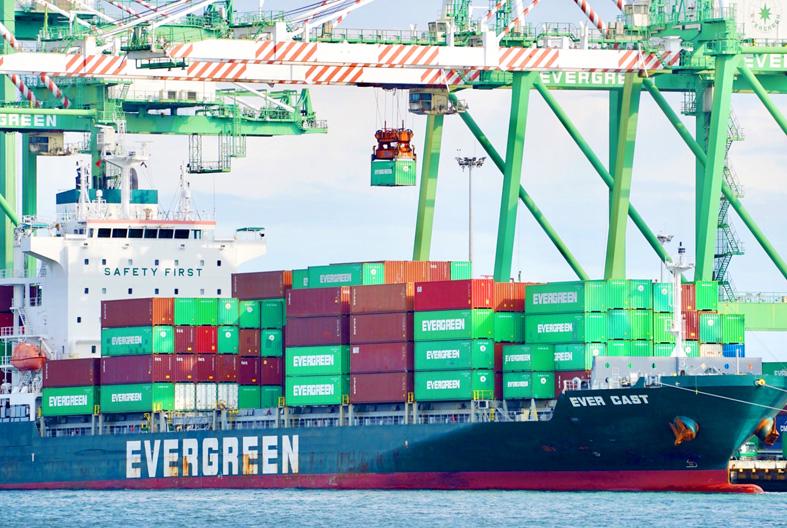Export orders expanded faster than expected at 9.5 percent year-on-year to US$58.83 billion last month as manufacturers resumed production in China, seeking to clear order backlogs after the country lifted COVID-19 lockdowns in many places, the Ministry of Economic Affairs said yesterday.
Last month was the best June on record, bringing second-quarter export orders to US$166.17 billion, up 3.2 percent from a year earlier, which the ministry attributed to accelerating digitalization worldwide and rising demand for emerging technologies such as 5G, high-performance computing and automotive devices.
On a quarterly basis, export orders showed a rare contraction of 4.02 percent from US$173.12 billion in the first quarter, but remained above the ministry’s upper estimate of US$164.3 billion.

Photo: CNA
“This was the first time in history that the nation registered lower second-quarter export orders than in the first quarter, reflecting the effects of China’s COVID-19 lockdowns,” Department of Statistics Director Huang Yu-ling (黃于玲) told an online news conference.
“The second quarter should be the weakest quarter of the year, as inventory building demand should help boost orders in the third quarter,” she said.
However, macroeconomic headwinds, soaring inflation, Russia’s war in Ukraine and COVID-19 flare-ups are factors that could hobble the nation’s export order expansion, she said.
Export orders are expected to drop 3.1 to 5.7 percent month-on-month to between US$55.5 billion and US$57 billion, the ministry said.
That would be an annual growth of 0.4 to 3.1 percent, it said.
“Exporters became more conservative about demand outlook as consumer confidence weakened and demand for consumer electronics sagged,” Huang said.
Orders for electronics components — primarily semiconductors — rose 11.7 percent year-on-year to US$18.75 billion last month, attributable to strong demand for chips used in high-performance computing applications, 5G and automotive electronics, marking the 29 consecutive months of growth.
Orders for information and communications technology products expanded 22 percent year-on-year to US$16.94 billion last month, as manufacturers saw smartphone and laptop orders deferred after China eased COVID-19 restrictions, which helped improve key component availability.
Orders for optoelectronic products slumped for a fourth straight month to US$1.96 billion due to falling demand for flat panels used in TVs and PCs, the ministry said.
Higher inventories contributed to the trend, it added.
Orders for base metals, mainly steel, rose 13.7 percent to US$2.78 billion last month amid inventory corrections and falling steel prices.
Machine tool orders slumped 8.3 percent to US$2.06 billion as manufacturers in China scaled back investment amid an economic slowdown.
Orders for plastic products declined 11.3 percent to US$2.3 billion last month, while those for petrochemical products surged 18.8 percent to US$2.22 billion, thanks to high global crude oil prices, the ministry said.

To many, Tatu City on the outskirts of Nairobi looks like a success. The first city entirely built by a private company to be operational in east Africa, with about 25,000 people living and working there, it accounts for about two-thirds of all foreign investment in Kenya. Its low-tax status has attracted more than 100 businesses including Heineken, coffee brand Dormans, and the biggest call-center and cold-chain transport firms in the region. However, to some local politicians, Tatu City has looked more like a target for extortion. A parade of governors have demanded land worth millions of dollars in exchange

An Indonesian animated movie is smashing regional box office records and could be set for wider success as it prepares to open beyond the Southeast Asian archipelago’s silver screens. Jumbo — a film based on the adventures of main character, Don, a large orphaned Indonesian boy facing bullying at school — last month became the highest-grossing Southeast Asian animated film, raking in more than US$8 million. Released at the end of March to coincide with the Eid holidays after the Islamic fasting month of Ramadan, the movie has hit 8 million ticket sales, the third-highest in Indonesian cinema history, Film

Taiwan Semiconductor Manufacturing Co’s (TSMC, 台積電) revenue jumped 48 percent last month, underscoring how electronics firms scrambled to acquire essential components before global tariffs took effect. The main chipmaker for Apple Inc and Nvidia Corp reported monthly sales of NT$349.6 billion (US$11.6 billion). That compares with the average analysts’ estimate for a 38 percent rise in second-quarter revenue. US President Donald Trump’s trade war is prompting economists to retool GDP forecasts worldwide, casting doubt over the outlook for everything from iPhone demand to computing and datacenter construction. However, TSMC — a barometer for global tech spending given its central role in the

Alchip Technologies Ltd (世芯), an application-specific integrated circuit (ASIC) designer specializing in server chips, expects revenue to decline this year due to sagging demand for 5-nanometer artificial intelligence (AI) chips from a North America-based major customer, a company executive said yesterday. That would be the first contraction in revenue for Alchip as it has been enjoying strong revenue growth over the past few years, benefiting from cloud-service providers’ moves to reduce dependence on Nvidia Corp’s expensive AI chips by building their own AI accelerator by outsourcing chip design. The 5-nanometer chip was supposed to be a new growth engine as the lifecycle